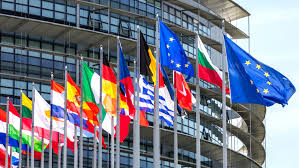Inflation is having a significant negative impact on consumers’ propensity to spend money in stores, according to the European Union, which also says increased interest rates are severely limiting access to financing for investment and consumption.
The European Commission, the executive branch of the EU, updated its prediction on Monday as recession fears increase and as the European Central Bank must decide this week whether to continue raising interest rates in order to contain inflation.The 20 nations that use the euro are likely to increase by 0.8% this year less than the 1.1% predicted in the spring forecast, according to the commission. Expectations for growth were cut from 1.6% to 1.3% for the next year.
The prediction was also revised downward for the larger 27-country EU, going from 1% to 0.8% this year and 1.7% to 1.4% the next year.Weakness in domestic demand, particularly consumption, indicates that high and steadily rising consumer prices for the majority of goods and services are having a greater impact than anticipated, according to a statement from the commission.
At a press conference, EU Economy Commissioner Paolo Gentiloni stated that the economy will likely experience “further weakening in the coming months” due to “multiple headwinds.”How far the ECB will raise interest rates is one area of concern. While more expensive borrowing slows economic growth in some sectors, such as the real estate market, higher rates could increase consumer spending power if they are successful in reducing inflation.
Even though the Eurozone barely avoided one during the winter and experienced 0.1% sluggish growth in the first two quarters of this year, recession fears have increased.According to Alexander Valentin, a senior economist at Oxford Economics, surveys of purchasing managers reveal that economic activity is declining in all significant economies in the Eurozone, which “adds to mounting recession risks.”
Germany, a country with a manufacturing- and export-oriented economy, has been a significant source of weakness as a result of rising energy prices and sluggish demand in China, a significant trading partner.For the biggest economy in Europe this year, the commission reduced its prediction to a negative 0.4%. The International Monetary Fund predicts a 0.3% drop in Germany’s economy this year, making it the only significant economy to do so.
Germany’s energy cost problems will take time to resolve, according to Gentiloni: “You don’t solve this in a couple of weeks.” He did, however, add that “this is a strong economy with the tools and the possibility to recover.”Because unemployment is at historic lows and wages are slowly catching up to the purchasing power lost to inflation as employees want and receive more, the overall situation of the Eurozone economy, despite its near-zero growth, doesn’t resemble a normal recession.
While food inflation continues to fall, energy prices have fallen since the harsh spike associated with Russia’s war in Ukraine. After reaching a peak of 10.6% in October, annual inflation dropped to 5.3% in July.The invasion of Ukraine and the COVID-19 outbreak struck the Eurozone as two simultaneous shocks. Russia cut off the majority of its natural gas supply to Europe, which caused prices to soar and sparked a rush to secure more expensive alternative sources.
Consumer prices increased as a result of the pandemic’s economic recovery because of shortages in the supply of raw materials and parts, which have now largely disappeared. Food was next to see higher prices, followed by services, a broad category that includes anything from haircuts and hotel stays to medical treatments and auto repairs.Some experts believe that the European Central Bank will hold off on raising interest rates on Thursday after nine straight increases due to the likelihood of weaker economic growth.
According to ECB President Christine Lagarde, the choice is up in the air and will be determined by the information at hand. The central bank has increased its benchmark deposit rate at the fastest rate since the introduction of the euro in 1999, going from minus 0.5% to 3.75% in just over a year.The EU projection was cut, and the euro is currently trading at $1.07 against the dollar, down from approximately $1.12 in late July.
One factor is the dollar’s continued rebound, which has seen gains versus other major currencies for eight consecutive weeks as the market places a greater emphasis on economic weakness in China and Europe than in the United States.The ECB’s situation may become more challenging if the euro declines because imported items with dollar-based prices, like energy, will cost more. On the other hand, it raises the price competitiveness of European exporters.


















